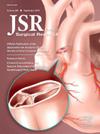代谢综合征与食管切除术后并发症的风险:国家外科质量改进计划研究。
IF 1.8
3区 医学
Q2 SURGERY
引用次数: 0
摘要
本文章由计算机程序翻译,如有差异,请以英文原文为准。
Metabolic Syndrome and the Risk of Postoperative Complications Following Esophagectomy: National Surgical Quality Improvement Program Study
Introduction
Metabolic syndrome has become a major health risk affecting patients worldwide and has been shown to be a risk factor for postoperative complications following abdominal surgery. This study aims to elucidate the link between metabolic syndrome and postoperative complications and mortality following esophagectomy.
Methods
This is a retrospective study analyzing the American College of Surgeons National Surgical Quality Improvement Program database (2017-2021). This study compared 30-d postoperative complications of patients undergoing esophagectomy with and without metabolic syndrome. Metabolic syndrome was defined as obesity (body mass index ≥30 kg/m2), diabetes, and hypertension.
Results
A total of 4911 patients met the study criteria, and of these, 303 patients (6.17%) met the inclusion criteria for the modified definition of metabolic syndrome. The metabolic syndrome group had higher American Society of Anesthesiologists scores compared to the control group (American Society of Anesthesiologists 3 or 4: 96% versus 84%, P < 0.001). Operative time was significantly higher in the metabolic syndrome group (378 mins versus 361, P = 0.004). Mortality was higher in the metabolic syndrome group (4.3% versus 2.3%, P = 0.03), as was serious morbidity (35% versus 30%, P = 0.05). Metabolic syndrome patients also had higher risks of postoperative complications of pneumonia (18.5% versus 14%, P = 0.04), unplanned intubation (15.5% versus 9.9%, P = 0.002), and sepsis (7.6% versus 4.9%, P = 0.04). On multivariate analysis, 30-d mortality was increased in the metabolic syndrome group.
Conclusions
Metabolic syndrome patients who undergo esophagectomy are associated with increased rates in morbidity and mortality. When controlled for other patient factors in multivariate analysis, 30-d mortality also had an associated increase. By focusing on modifiable risk factors with metabolic syndrome patients, mortality and morbidity for this high-risk procedure could be reduced in the future.
求助全文
通过发布文献求助,成功后即可免费获取论文全文。
去求助
来源期刊
CiteScore
3.90
自引率
4.50%
发文量
627
审稿时长
138 days
期刊介绍:
The Journal of Surgical Research: Clinical and Laboratory Investigation publishes original articles concerned with clinical and laboratory investigations relevant to surgical practice and teaching. The journal emphasizes reports of clinical investigations or fundamental research bearing directly on surgical management that will be of general interest to a broad range of surgeons and surgical researchers. The articles presented need not have been the products of surgeons or of surgical laboratories.
The Journal of Surgical Research also features review articles and special articles relating to educational, research, or social issues of interest to the academic surgical community.

 求助内容:
求助内容: 应助结果提醒方式:
应助结果提醒方式:


